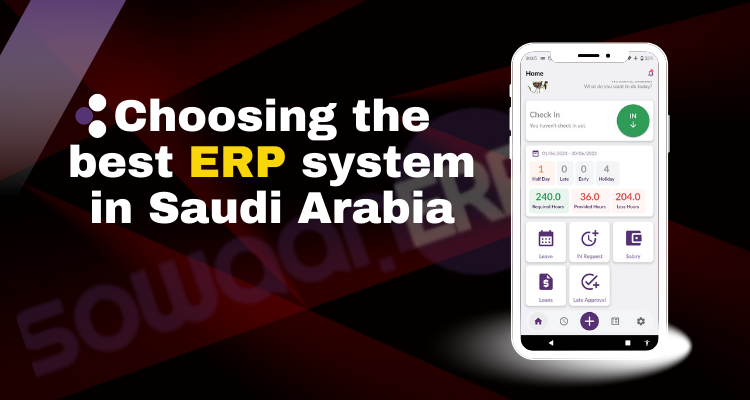
Selecting an ERP system can be a daunting task. However, with the right ERP recommendations, the process becomes less challenging. In Saudi Arabia, businesses are increasingly turning to ERP systems to streamline their operations. ERP systems enhance coordination, improve efficiency, and provide valuable insights into business processes. They offer a holistic view of business operations, making it easier to identify areas for improvement. Furthermore, they reduce manual workload, allowing employees to focus on more strategic tasks. This shift towards digitalization is helping businesses in Saudi Arabia stay competitive in today’s dynamic market environment.
Why need for ERP system?
 Firstly, let’s understand why a business might need an ERP system. Essentially, it helps businesses manage their resources more effectively. It integrates various departments, enabling seamless communication and data sharing. Also, it automates repetitive tasks, thus saving time and reducing errors.
Firstly, let’s understand why a business might need an ERP system. Essentially, it helps businesses manage their resources more effectively. It integrates various departments, enabling seamless communication and data sharing. Also, it automates repetitive tasks, thus saving time and reducing errors.
In addition, an ERP system provides real-time data, enabling quick and informed decision-making. It eliminates the need for disparate systems, leading to improved operational efficiency and cost savings. Furthermore, it supports business scalability by adapting to changing needs and growth. With an ERP system, businesses can enhance their customer service by providing faster response times and personalized experiences. Lastly, the system ensures regulatory compliance by keeping track of all transactions and processes, which is crucial in today’s complex business environment.
Key features of the best ERP system in Saudi Arabia
When looking to buy the best ERP system in Saudi Arabia, certain key features should not be overlooked. Firstly, the system must offer real-time data analysis. This allows for informed decision making. Secondly, it should have robust security measures to protect sensitive data. Lastly, it should be user-friendly, reducing the learning curve for employees.
In addition, the best ERP system should be customizable to fit your specific business needs. It should also offer mobility, enabling employees to access the system from anywhere at any time. This increases productivity and ensures business continuity. Moreover, it should incorporate AI and machine learning capabilities for predictive analytics and intelligent automation. Finally, the system should provide comprehensive reporting tools for better visibility and control over business operations. These features can significantly enhance the efficiency and effectiveness of your business processes.
How to choose the best ERP system?
Choosing the best ERP system in Saudi Arabia involves considering several factors. These include understanding your business needs, setting a budget, and researching different vendors. Additionally, consider the scalability of the system. As your business grows, your system should be able to handle increased demand.
Furthermore, it’s crucial to consider the system’s integration capabilities with your existing software to ensure seamless operations. Also, check the vendor’s reputation and their after-sales support services – you want a reliable partner who’ll be there when you need help. The user interface of the ERP system is another important factor; it should be intuitive and easy to use to minimize training time. Lastly, seek references or case studies from similar industries to understand how the ERP system has benefited them. This will provide a clearer picture of what you can expect from the system.
ERP recommendations
Here are some ERP recommendations to help you choose the right system. Firstly, consider cloud-based ERP systems. They are cost-effective and offer greater flexibility. Secondly, look at the vendor’s reputation. Research their customer service and support capabilities. Lastly, ask for a demo before making a decision. This will give you a feel of the system’s functionality.
Case studies on the best ERP system implementations in Saudi Arabia
 Case studies can provide valuable insights into the effectiveness of an ERP system. They highlight both the challenges and successes of implementing such systems. A notable case study is the ERP implementation at King Saud University (KSU), one of the leading universities in Saudi Arabia. The university’s successful ERP implementation made it a benchmark in the educational sector. The study identified critical success factors such as adherence to governmental regulations, effective project management, and stakeholder involvement.
Case studies can provide valuable insights into the effectiveness of an ERP system. They highlight both the challenges and successes of implementing such systems. A notable case study is the ERP implementation at King Saud University (KSU), one of the leading universities in Saudi Arabia. The university’s successful ERP implementation made it a benchmark in the educational sector. The study identified critical success factors such as adherence to governmental regulations, effective project management, and stakeholder involvement.
A case study on the private hospitals in Saudi Arabia found that 83% of them have implemented or are currently implementing the ERP system. This adoption has led to streamlined operations, better patient data management, and enhanced service delivery.
Lastly, a study in the Saudi Arabian food industry highlighted user perspective as a critical factor in achieving ERP system implementation success. It emphasized the importance of user training and involvement in the implementation process
Conclusion
Selecting the best ERP system in Saudi Arabia requires careful consideration. With the right ERP recommendations, you can find a system that meets your business needs. Remember, the key features of the best ERP system in Saudi Arabia include real-time data analysis, robust security, and user-friendliness. By considering these features and following the provided ERP recommendations, you can successfully implement an ERP system that will streamline your operations and contribute to business growth.
